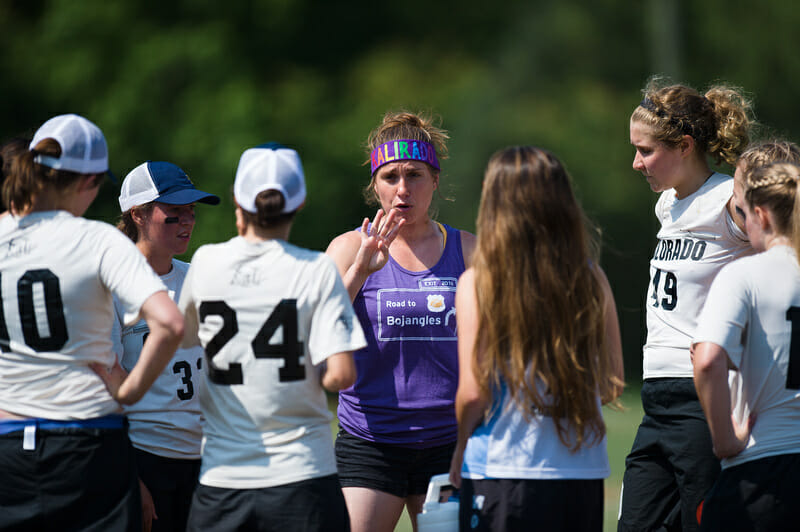Taking your team to the next level doesn't happen by accident.
January 28, 2020 by Michael Aguilar in Analysis with 0 comments

Tuesday Tips are presented by Spin Ultimate; all opinions are those of the author. Please support the brands that make Ultiworld possible and shop at Spin Ultimate!
It just so happens that, after a three year hiatus from coaching, I’m back in the position of thinking about developing a team over the course of a season of competitive ultimate. Having spent nearly a decade in a classroom and developing the curriculum for four different courses at the high school I taught at, I realized that I may have some unique insights to offer when it comes to planning a season with the growth of your team in mind.
Too many ultimate teams, even some with coaches (and even some experienced coaches!), are stuck simply reacting to input as it crosses their proverbial desks. Rather than considering what the team has mastered and what the team needs to improve upon, teams are only responding to their most recent feedback (often a tournament or game) without considering how that response does or doesn’t suit their goals for the season as a whole.
So, with that in mind, let’s begin with the most important lesson that any new teacher learns about planning their year in a classroom.
Begin with the End in Mind
If you don’t know where you want to end up, there simply is no point in even starting. There is, as a subset of this point, a lot of discussion about what good goal-setting involves but let’s try and simplify things by saying that “making Nationals” or “finishing in the top half of the region” or “making Regionals” are NOT good goals or the type of “end” that I’m interested in. Rather, think about some more specific ideas that will help you achieve those extremely broad goals that I listed above.
What does your team need to develop in order to achieve your broader goal? Here it is a good idea to be specific but not too specific. Some suggestions:
- Develop a consistent reset system that the entire team knows thoroughly
- Develop proficient red zone offense
- Develop 1-3 “plays” for specific situations (bringing disc in on defending cone, bringing disc in on attacking cone, bringing disc in red zone [backhand sideline, forehand sideline, middle of the field], etc.)
- Develop principles that govern a zone offense
- Develop principles that govern a base matchup defense
- Develop 2-3 zone defenses that can be employed in a variety of situations
- Develop 2-3 variations on base matchup defense (trapping marks, switching poaches, over-the-top person defense, force middle, etc. etc.)
- Develop team conditioning to an elite level
- Develop team power and strength to the next level
Depending on your starting point as a team, as you’ll find out, I would say these are likely already too many goals to achieve in a single season. If you’re thinking about a youth team, these may be decent goals to set over a 3-4 year cycle. If you’re thinking about a college team, if you begin with these goals in the fall, this may be achievable in a season (if your team is dedicated and experienced) or two. If you’re thinking about a club team, you may be able to achieve most of these goals over the course of a season, depending on your practice and tournament schedule.
Prioritize
This is one spot where I can’t really help you. You have to know your team and what it excels at in order to properly organize your goals.
Are you returning two experienced handlers that will be handling most of your throwing responsibilities? Well, perhaps you need less work on your reset system and more work on cutting trees. Do you have a roster that is deep but lacking in athletic talent? Then perhaps you should get to work on your zone defenses that may help you outwit teams that can out-athlete you. Is your team completely inexperienced? Then scrap some of the more advanced goals and focus on making sure everyone on your team can throw a ten yard around forehand/backhand and knows the basics of marking.
Consider this as well: Many of the more advanced concepts build on each other. Therefore, saving them for the end of the season may be more achievable because they are more quickly mastered once foundational concepts are mastered. To give an example: the concepts of one zone defense often translate to another. Though they may not map exactly, they will build and grow cohesively.
As a general rule, I would offer this: it may be worth achieving your offensive goals as a top priority. As a simple governing principle: If you cannot possess the disc reliably, it does not matter how good your defense is, you will lose, often. If you can possess the disc, you will probably win a lot on those merits alone. Once you’ve achieved some basic offensive goals then you can move on to advanced defensive and offensive concepts that will complement your reliable offensive performance.
Next week, in part two, we will discuss assessing progress towards your goals and being flexible with your approach.